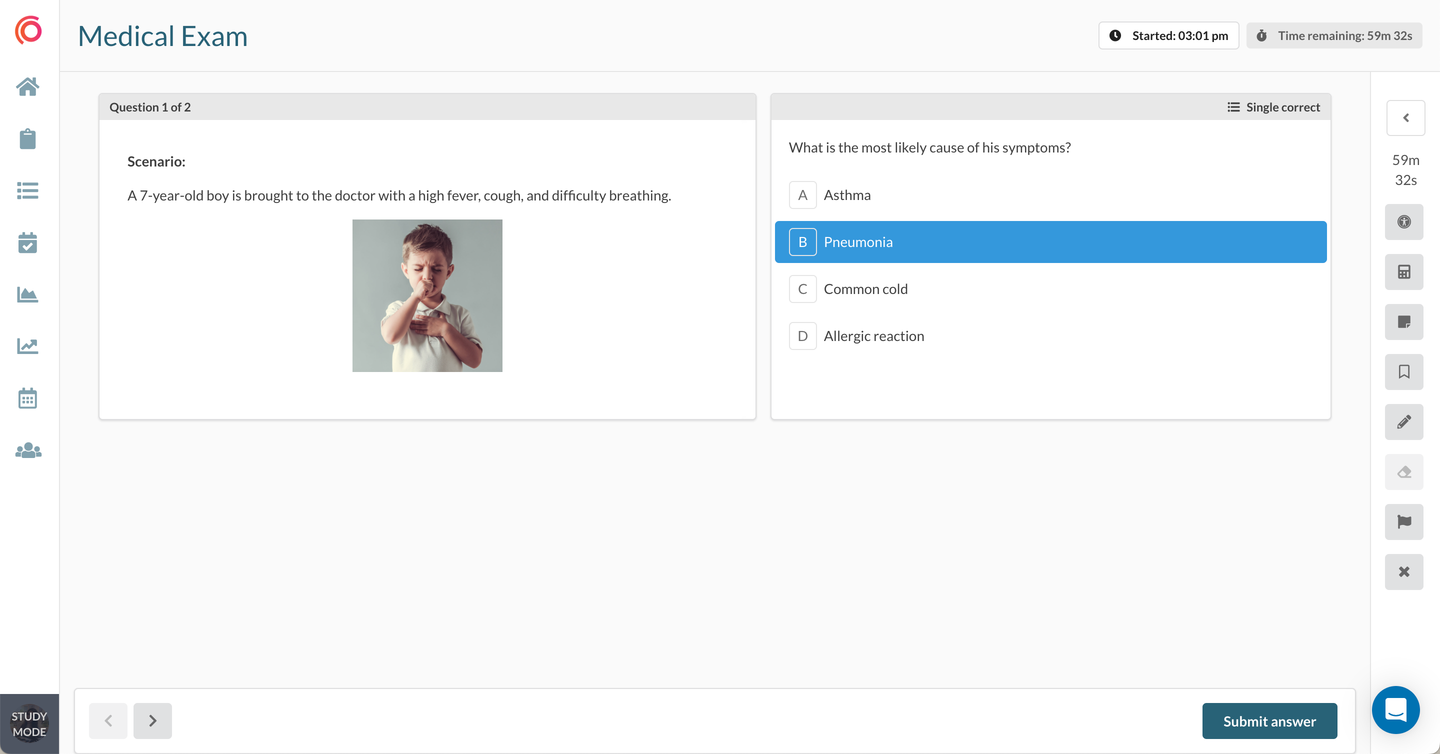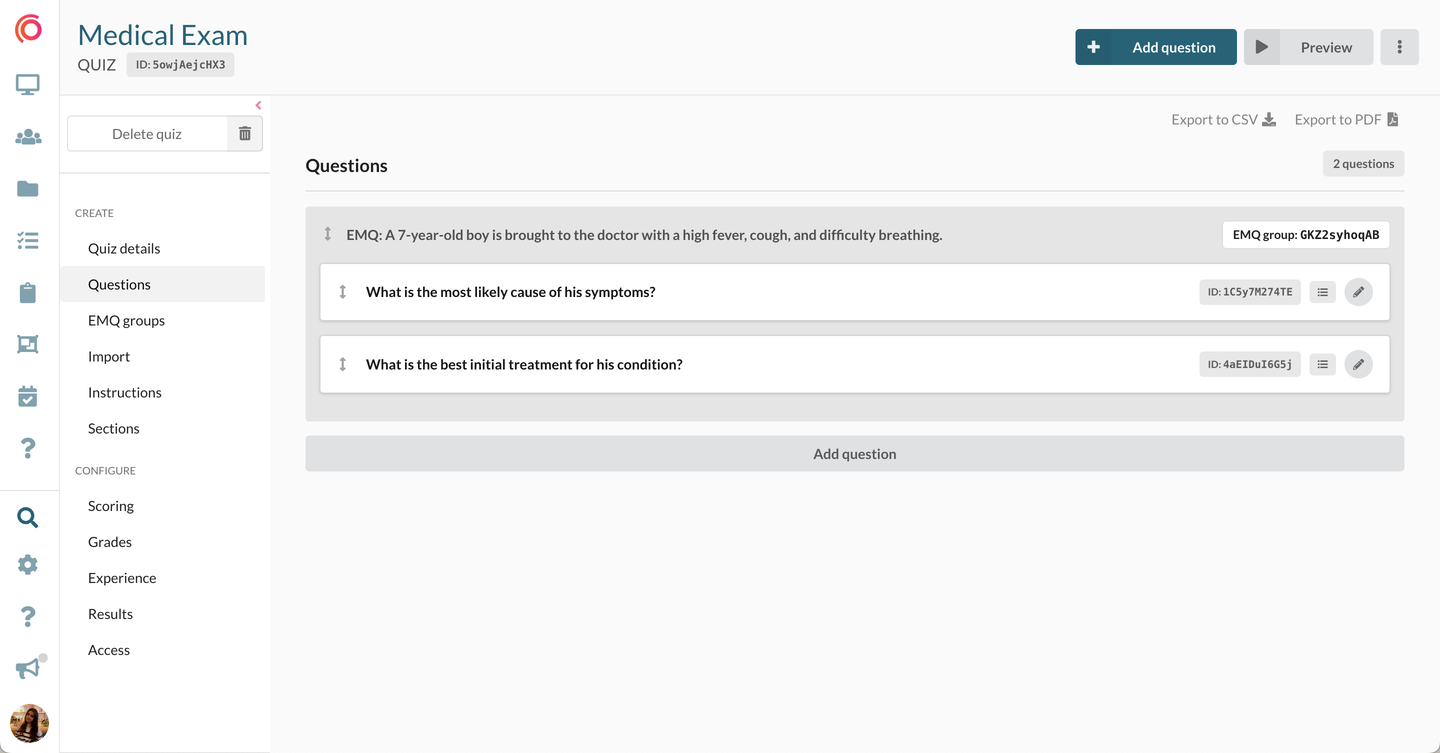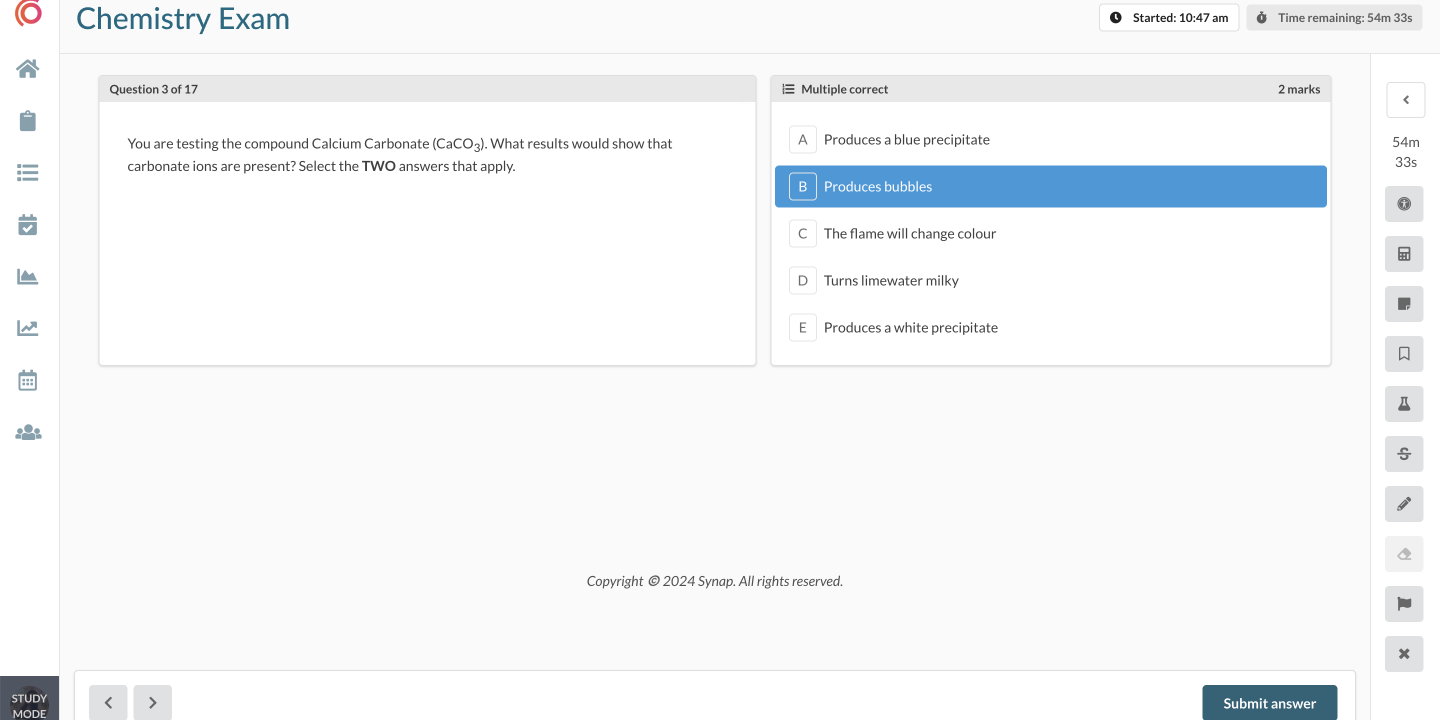Extended Matching Questions (EMQs) are an increasingly popular format in online exams, particularly for assessing critical thinking and applied knowledge. While they share similarities with traditional multiple-choice questions, EMQs go a step further by testing knowledge in a more applied and in-depth way.
What is an EMQ question?
EMQs (Extended Matching Questions) are an assessment format that links multiple questions to a shared scenario or stem. They typically begin with a central piece of text, such as a case study or clinical scenario, followed by related questions that require candidates to analyse the content and respond appropriately.

What is the difference between an EMQ and MCQ?
Unlike traditional multiple-choice questions (MCQs), which test isolated facts, EMQs evaluate a candidate’s ability to apply knowledge in a broader, more contextual way. This makes them especially valuable in fields like healthcare and aviation, where diagnostic reasoning and critical thinking are key.
What are popular use cases for EMQs?
By grouping related questions around a shared context or resource, EMQs enable a more comprehensive evaluation of a candidate’s abilities. Below are some of the most common applications of EMQs in online exams:
- Comprehension: Presenting a large body of text shared across multiple questions to test understanding and interpretation.
- Situational judgement: Using a shared, scenario-based stem with different related questions to assess decision-making skills.
- Abstract reasoning: Providing a common image or pattern that serves as the basis for several distinct questions.
- Instructions: Offering a shared set of instructions for a group of questions, such as specifying that a calculator should not be used for a particular set of problems.
- Shared question information: Sharing the same data, such as a formula, table, or other relevant information, across multiple questions - ideal for subjects like mathematics.
This structure not only streamlines exam creation but also enhances the assessment of applied knowledge in a practical, real-world context.

What are the benefits of an EMQ question?
Online exam platforms that provide EMQ functionality, offer numerous advantages for both educators and learners, making them a valuable addition to online assessments:
- Efficient question design: EMQs allow multiple questions to be linked to a single piece of text or scenario, saving administrators significant time and effort in creating exams. This reduces redundancy, as the same context does not need to be repeated for each question.
- Encourages applied knowledge: By requiring candidates to interpret and apply information from a shared context, EMQs go beyond simple recall of facts. They promote critical thinking and test a deeper understanding of the subject matter.
- Real-world relevance: EMQs closely mimic real-world problem-solving, particularly in fields like healthcare, where professionals must analyse complex scenarios and make informed decisions based on multiple factors.
- Comprehensive assessment: EMQs allow for the assessment of various aspects of a topic within a single framework. This helps educators evaluate a wide range of skills, such as reasoning, decision-making, and knowledge application, all in one format.
- Reduced cognitive load for candidates: Since all questions are tied to a single passage or scenario, learners can focus on applying their knowledge without having to repeatedly process new contexts. This can improve exam performance by keeping candidates engaged and reducing unnecessary complexity. These benefits make EMQs an effective tool for online assessments, particularly in disciplines where critical thinking are essential.
EMQ question example for online exam delivery
To illustrate how an EMQ works in online exams, here’s an example: .gif) In this straightforward example, a single scenario is provided, followed by two related questions, each with its own set of distinct answer options. The scenario text is entered only once, allowing administrators to quickly add multiple related questions without duplicating effort. This not only streamlines the exam creation process but also challenges candidates to carefully analyse the scenario and apply their knowledge effectively.
Tips for how to write effective EMQs
Creating well-structured EMQ questions ensures that online exams are both fair and effective at assessing applied knowledge. Here are some tips for crafting high-quality EMQs:
- Start with a clear and relevant scenario: The scenario or case study should be concise, focused, and directly related to the subject matter being assessed. Avoid including unnecessary details that might confuse or distract candidates.
- Ensure the scenario is broadly applicable: Write a scenario that allows for multiple related questions to be asked. This ensures the EMQ exam format is used effectively to assess different aspects of the topic.
- Link questions clearly to the scenario: Each question should directly relate to the central scenario. Use precise language in the questions to reduce ambiguity and ensure candidates understand what is being asked.
- Vary the answer options across questions: For each question linked to the scenario, use a distinct set of answer options where appropriate. This reduces predictability and encourages critical thinking.
- Balance difficulty levels: Include a mix of straightforward and more challenging questions. This provides an opportunity to test both foundational knowledge and higher-order thinking skills.
- Test for real-world application: Ensure your EMQs assess the ability to apply knowledge in realistic or practical contexts. This is especially important in fields like healthcare, where decision-making skills are crucial.
- Review for accuracy: Double-check the scenario, questions, and answer options for clarity, grammar, and subject accuracy. Testing the EMQs with a colleague can help identify potential issues. By following these tips, you can design EMQ questions that are efficient to create and provide an effective assessment of candidates' skills and knowledge.
Deliver effective EMQ online exams today
Explore how Synap’s EMQs functionality streamlines online exam delivery, with a tailored demo and 14-day free trial.



